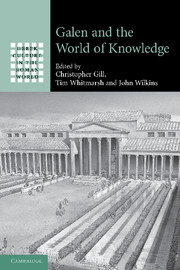Book contents
- Frontmatter
- Contents
- Notes on contributors
- Note on conventions
- Preface
- Introduction
- 1 Galen's library
- 2 Conventions of prefatory self-presentation in Galen's On the Order of My Own Books
- 3 Demiurge and Emperor in Galen's world of knowledge
- 4 Shock and awe: the performance dimension of Galen's anatomy demonstrations
- 5 Galen's un-Hippocratic case-histories
- 6 Staging the past, staging oneself: Galen on Hellenistic exegetical traditions
- 7 Galen and Hippocratic medicine: language and practice
- 8 Galen's Bios and Methodos: from ways of life to path of knowledge
- 9 Does Galen have a medical programme for intellectuals and the faculties of the intellect?
- 10 Galen on the limitations of knowledge
- 11 Galen and Middle Platonism
- 12 ‘Aristotle! What a thing for you to say!’ Galen's engagement with Aristotle and Aristotelians
- 13 Galen and the Stoics, or: the art of not naming
- Bibliography
- Index
8 - Galen's Bios and Methodos: from ways of life to path of knowledge
Published online by Cambridge University Press: 06 August 2010
- Frontmatter
- Contents
- Notes on contributors
- Note on conventions
- Preface
- Introduction
- 1 Galen's library
- 2 Conventions of prefatory self-presentation in Galen's On the Order of My Own Books
- 3 Demiurge and Emperor in Galen's world of knowledge
- 4 Shock and awe: the performance dimension of Galen's anatomy demonstrations
- 5 Galen's un-Hippocratic case-histories
- 6 Staging the past, staging oneself: Galen on Hellenistic exegetical traditions
- 7 Galen and Hippocratic medicine: language and practice
- 8 Galen's Bios and Methodos: from ways of life to path of knowledge
- 9 Does Galen have a medical programme for intellectuals and the faculties of the intellect?
- 10 Galen on the limitations of knowledge
- 11 Galen and Middle Platonism
- 12 ‘Aristotle! What a thing for you to say!’ Galen's engagement with Aristotle and Aristotelians
- 13 Galen and the Stoics, or: the art of not naming
- Bibliography
- Index
Summary
It is clear that Galen's medicine is first and foremost a rational type of medicine, based on the supremacy and value of his method. Galen dedicated a major work, in fourteen books, to the fundamental principles of this method: On the Therapeutic Method (MM) (Kühn X. 1–1021). At the same time, the story of his life and autobiographical anecdotes play an exceptional part in Galen's work. This point has been noted, as the combination of scientific and autobiographical writing remains highly original in medical literature. However, as far as I know, the extent of the linkage between the methodological objectives of Galen, the physician, and the autobiographical project of Galen, the writer, has never been fully brought out. I am, however, deeply convinced not only that there is a strong and unbreakable link between bios and methodos (life and method) in Galen's work, but also that he sees this link as having a particularly important part to play in the acquisition of every kind of knowledge. That is to say, the bios–methodos combination undoubtedly lies at the heart of the world of knowledge to which ancient medicine so powerfully contributed. In late antiquity, Galenic medicine was at the forefront of Greek literature: it maintained very close and original ties with other disciplines such as history, rhetoric and philosophy, and made a truly major contribution to the construction of the world of learning.
- Type
- Chapter
- Information
- Galen and the World of Knowledge , pp. 175 - 189Publisher: Cambridge University PressPrint publication year: 2009
- 2
- Cited by



